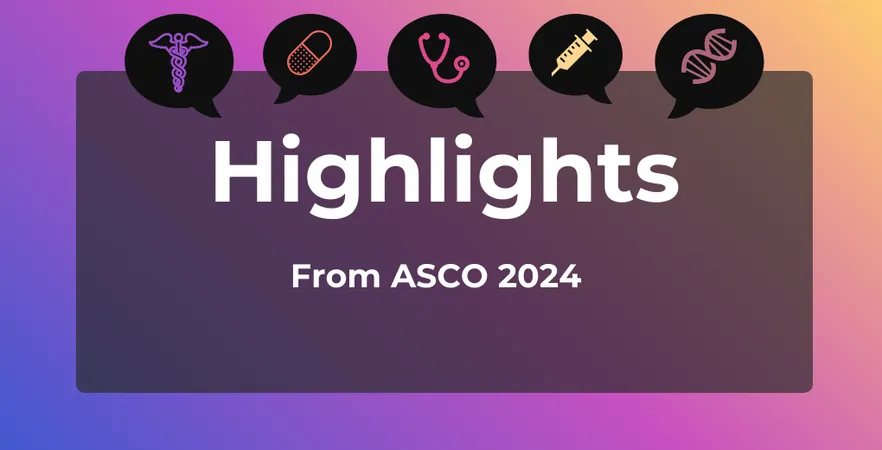
Groundbreaking Insights from ASCO 2024: What You Need to Know
2024-12-21
Author: Sarah
5. Osimertinib: A Game Changer for Stage III EGFR-Driven NSCLC
The LAURA trial (NCT03521154) revealed that osimertinib (Tagrisso) boosts progression-free survival (PFS) by an astounding 84% compared to current standard treatments for patients with unresectable EGFR-mutated non-small cell lung cancer (NSCLC). This remarkable finding suggests that osimertinib, already approved for earlier-stage disease, could soon set a new benchmark in patient care after chemoradiotherapy, offering hope to those who previously had limited options.
4. Breakthrough in Preventing Adverse Effects in Multiple Myeloma Treatment
In a pioneering pilot study (OPTec, NCT05972135), the first 10 patients with multiple myeloma who received a preventative dose of tocilizumab prior to teclistamab treatment reported no cases of cytokine release syndrome (CRS) or neurotoxicity. These encouraging results point towards a promising strategy for reducing severe side effects, allowing greater access to teclistamab—an innovative bispecific antibody targeting B-cell maturation antigen (BCMA) and CD3 on T-cells.
3. Navigating New FDA Approvals: What Practitioners Should Know
Recent FDA approvals, particularly nirogacestat, marketed as Ogsiveo, present new treatment avenues for desmoid tumors. However, practitioners must be vigilant regarding common side effects such as diarrhea and nausea, along with potential ovarian toxicity for women of childbearing age. Similarly, fruquintinib shows promise in metastatic colorectal cancer (mCRC) but may accompany risks like hypertension and anemia, necessitating close monitoring and patient education on fertility issues.
2. Multicancer Early Detection Tests: The Promise vs. Reality
Multicancer early detection (MCED) tests have the potential to revolutionize cancer screening but are currently underutilized due to various barriers, including high costs and lack of insurance coverage. While still in developmental phases for many providers, the adoption of these tests is crucial for enhancing early detection, particularly in marginalized communities that face significant healthcare disparities—underscoring the need for strategic policy revisions.
1. Telehealth's Role in Palliative Care: A Clinical Game-Changer
An extensive new study concluded that telehealth can deliver early palliative care with outcomes on par with traditional in-person visits for patients suffering from advanced NSCLC. This finding not only strengthens the case for virtual health services but also highlights the necessity for continued discussions regarding caregiver support and equitable access to telehealth tools, particularly in oncology, where the demand for palliative care is escalating.
As the oncology community continues to grapple with how to implement these findings into daily practice, the implications for patient care, particularly around health equity, are significant. This year's ASCO meeting serves as a crucial platform for medical professionals to adapt and improve cancer treatment strategies for a more inclusive future. Stay tuned as these developments can reshape the landscape of oncology care!


 Brasil (PT)
Brasil (PT)
 Canada (EN)
Canada (EN)
 Chile (ES)
Chile (ES)
 España (ES)
España (ES)
 France (FR)
France (FR)
 Hong Kong (EN)
Hong Kong (EN)
 Italia (IT)
Italia (IT)
 日本 (JA)
日本 (JA)
 Magyarország (HU)
Magyarország (HU)
 Norge (NO)
Norge (NO)
 Polska (PL)
Polska (PL)
 Schweiz (DE)
Schweiz (DE)
 Singapore (EN)
Singapore (EN)
 Sverige (SV)
Sverige (SV)
 Suomi (FI)
Suomi (FI)
 Türkiye (TR)
Türkiye (TR)